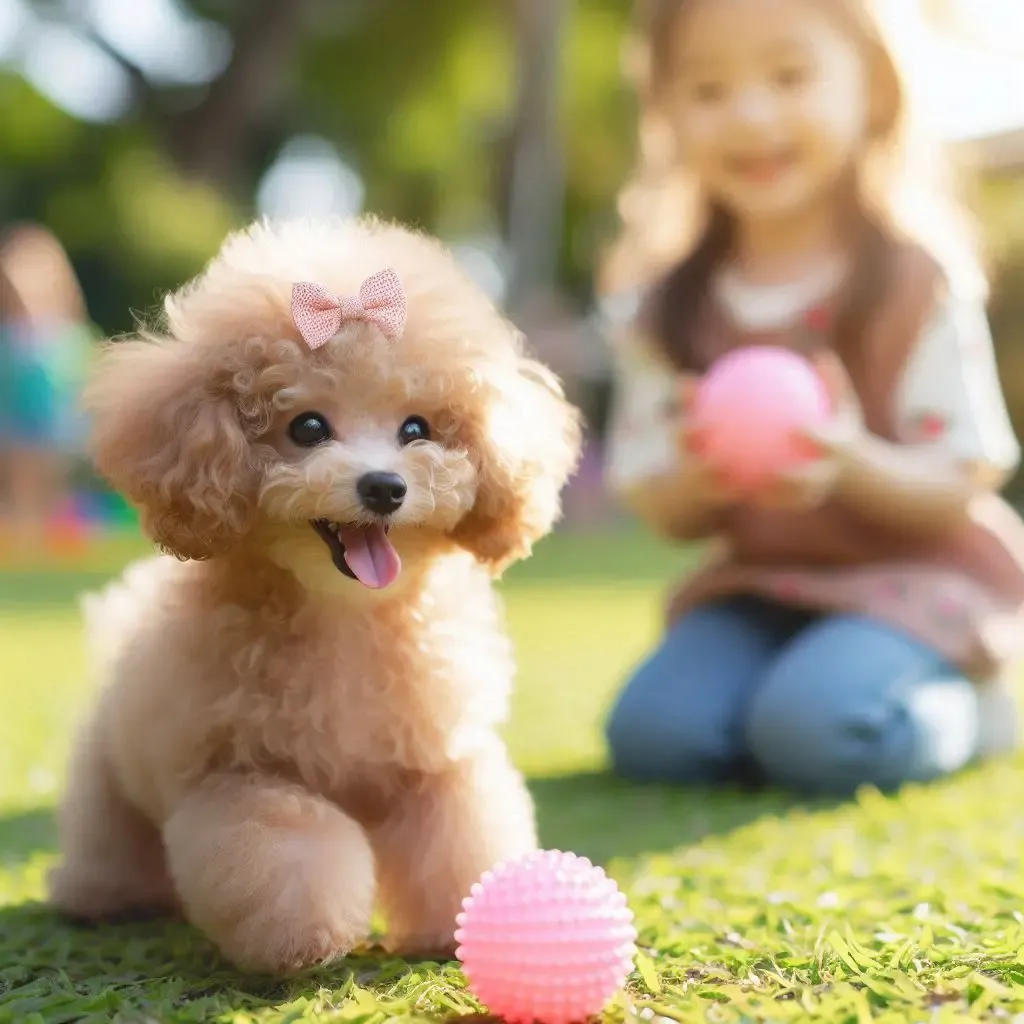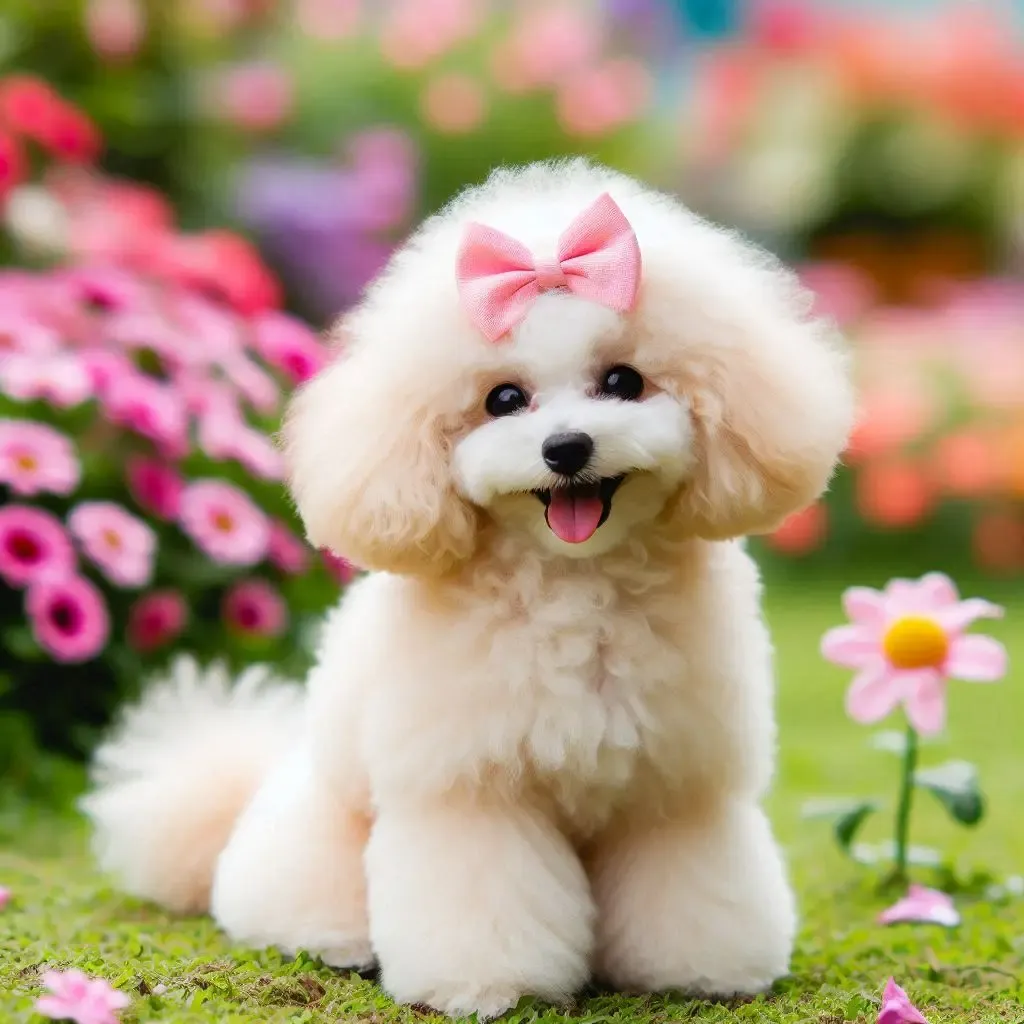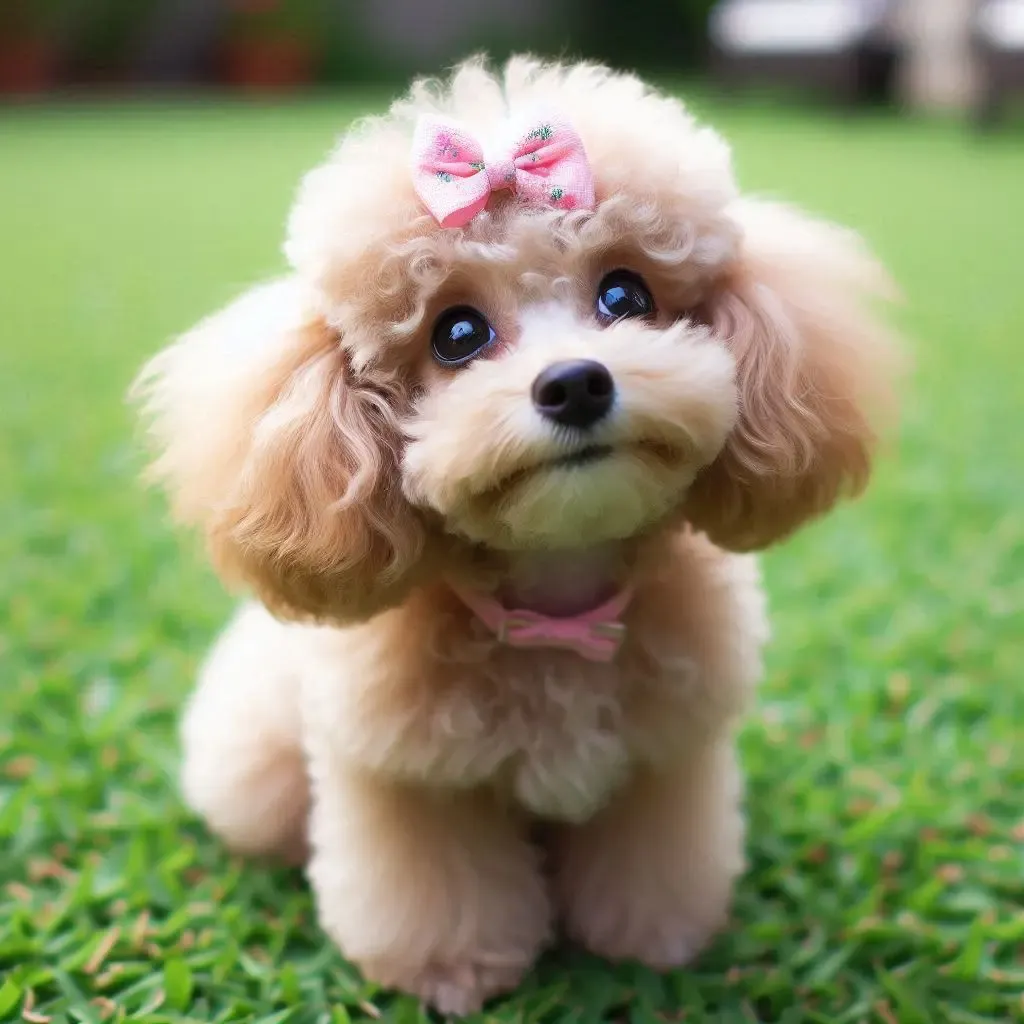- Twisted Tea: The Ultimate 2025 Guide(Kept up to date) - 08/13/2025
- 100 Best Eat & Drink Ultimate 2025 Global List - 08/11/2025
- Top 10 Celsius Drink: The Ultimate 2025 Guide - 08/07/2025

Table of Contents
The Toy Poodle is a small yet charismatic dog that has been adored by pet owners for centuries. Despite its size, this breed is packed with personality, intelligence, and elegance, making it a beloved choice for families, singles, and seniors alike. Here’s a closer look at what makes the Toy Poodle such a remarkable breed.
History and Origins
The Toy Poodle is a variation of the larger Standard Poodle, which was originally bred in Germany as a water retriever, known for its ability to fetch game from the water. The word “Poodle” is derived from the German word “pudel,” meaning “to splash in the water.” However, the breed as we know it today was developed in France, where it gained immense popularity among the French aristocracy and eventually became the country’s national dog.
The Toy Poodle, specifically bred to be a companion dog, was designed to be a smaller, more portable version of the Standard and Miniature Poodles. It emerged in the 18th century, primarily serving as a companion for noble ladies. Their small size and delightful appearance made them perfect lap dogs, and they quickly became symbols of style and elegance.
Appearance
Toy Poodles are the smallest of the three poodle sizes, standing no taller than 10 inches at the shoulder and weighing between 4 to 6 pounds. Despite their petite size, they have a compact, sturdy frame and an elegant stance. Their most distinguishing feature is their curly, dense coat, which can come in a variety of solid colors, including white, black, apricot, red, silver, blue, gray, and brown.
Their eyes are dark and oval-shaped, with an alert and intelligent expression. Toy Poodles have floppy ears that hang close to their heads, adding to their distinctive appearance. Their coat is often trimmed into different styles, such as the “Continental” or “English Saddle” clips, which enhance their elegant and regal look.
Temperament and Personality
The Toy Poodle is known for its lively, affectionate, and friendly nature. They are intelligent and eager to please, making them one of the most trainable dog breeds. They thrive on human interaction and form deep bonds with their owners, often becoming very attached to their families. Their high intelligence allows them to learn commands and tricks quickly, and they excel in activities such as obedience, agility, and even therapy work.
Toy Poodles are also known for their playful and sometimes mischievous personalities. They are alert and inquisitive, always interested in their surroundings, and they make excellent watchdogs, often barking to alert their owners of any unusual activity. However, this barking tendency can become excessive if not properly managed through training.
Exercise and Training Needs
Despite their small size, Toy Poodles are active dogs that require regular exercise to stay healthy and happy. Daily walks, play sessions, and mental stimulation through games and puzzles are essential to keep them engaged. They enjoy activities such as fetching, running, and even swimming. Toy Poodles are adaptable and can live comfortably in both apartments and larger homes, provided they receive sufficient exercise and stimulation.
Training is relatively easy with Toy Poodles due to their intelligence and eagerness to learn. They respond best to positive reinforcement methods, such as treats, praise, and playtime. Socialization from a young age is important to help them become well-rounded dogs and prevent behavioral issues like excessive barking, shyness, or anxiety.
Grooming and Maintenance
One of the most notable aspects of the Toy Poodle is its coat. The breed is hypoallergenic, meaning it sheds very little, which is ideal for people with allergies. However, this dense, curly coat requires regular grooming to keep it healthy and free from mats. Frequent brushing—at least a few times a week—is necessary, along with professional grooming every 4 to 6 weeks to maintain their coat’s shape and prevent tangles.
Additionally, Toy Poodles need regular ear cleaning, nail trimming, and dental care. Their ears should be checked regularly for signs of infection, and their teeth should be brushed frequently to prevent dental problems, which are common in small breeds.
Health and Lifespan
Toy Poodles are generally healthy dogs, with a lifespan of 12 to 15 years. However, they can be prone to certain health issues, such as patellar luxation (a dislocated kneecap), progressive retinal atrophy (a degenerative eye condition), epilepsy, and dental problems. Regular veterinary check-ups, a healthy diet, and maintaining a proper weight can help minimize these risks.


Is a Toy Poodle Right for You?
Toy Poodles make wonderful pets for a wide range of households. Their small size makes them suitable for apartment living, and their affectionate, playful nature ensures they fit well with families, singles, and seniors. They are perfect for those who can dedicate time to grooming, training, and providing regular exercise and mental stimulation.
If you are looking for a small, intelligent, and affectionate companion with a playful spirit and a touch of elegance, the Toy Poodle could be the perfect choice for you. With their unique combination of intelligence, beauty, and personality, they are sure to bring joy and companionship to any home.
Best Home Theatre Installation(4 Steps) – love a happy home (loveahh.com)
- How to Be Funny Ultimate 2025 Guide
- 100 Best Guess What Jokes Ultimate 2025 Guide
- What the Difference Between Jokes? 2025 In-Depth
- What Is a Homemaker? 2025 Expert-Backed Guide
- 100 Best Dad Jokes for Kids 2025 Ultimate Guide
- 100 Best Bad Dad Jokes 2025 Ultimate Guide
- 100 Best Deez Nuts Joke 2025 Ultimate Guide
- 100 Best Candice Joke 2025 In-Depth Guide
- Top 100 Best Christmas Movies 2025 In-Depth Guide
- Top 100 Best Christmas Family Games 2025
- Top 100 Best Fun Family Games 2025 In-Depth Guide
- Top 100 Best Family Games 2025 Ultimate Guide
- 100 Talk Show Hosts 2025 In-Depth Guide
- 100 Best Funny Dad Jokes 2025 In-Depth Guide
- 100 Best Funny Games 2025 In-Depth Guide
- 100 Best Funny Names 2025 In-Depth Guide
Amazon Best Sellers in Clothing & Shoes – Top 10 Must-Have Picks 2025
Let's be real - when you need stylish, comfy clothes without breaking the bank, Amazon's got your back. They're killing it with everything from chill weekend looks to sharp office outfits, all at prices that actually make sense.
We've dug through the bestsellers to bring you:
🔥 The top 10 clothing & shoe picks flying off the virtual shelves
👍 Real customer takeaways (the good, the bad, the "OMG must-have")
💡 How to style each piece for maximum impact
✨ Why these particular items are crushing it in reviews
Whether you're doing a full closet refresh or just need some solid basics, these crowd-pleasers deliver on quality, comfort, and that "I actually want to wear this" factor.
1. Carhartt Men's Loose Fit Heavyweight Short-Sleeve Pocket T-Shirt
Product Overview
Carhartt is known for its durable workwear, and their Men's Loose Fit Heavyweight Short-Sleeve Pocket T-Shirt is no exception. This shirt is designed with 100% cotton to provide a comfortable, breathable, and long-lasting wear. The loose fit adds flexibility for movement, making it a great choice for work or leisure.
Key Features:
- 100% cotton material ensures breathability and comfort
- Loose fit design allows for maximum mobility
- Chest pocket for added utility
- Available in a variety of colors
- Machine washable, making maintenance easy
User Reviews
Customers rave about the sturdy material and the long-lasting durability of this shirt. Many note that it is perfect for daily wear, even in physically demanding jobs. While some buyers found it a bit roomy for a more tailored fit, others appreciate the comfortable and relaxed style.
Style Tips & Outfit Suggestions
This Carhartt t-shirt is perfect for layering under a jacket or hoodie for a casual look. Pair it with jeans, cargo pants, or shorts for an easygoing weekend outfit. It’s ideal for anyone who needs durable, comfortable clothing that withstands tough conditions.
2. Gildan Men's Crew T-Shirts, Multipack, Style G1100
Product Overview
Gildan's Crew T-Shirts Multipack is a cost-effective solution for those in need of basic t-shirts. Known for their comfort and affordability, these t-shirts are made from a cotton blend, ensuring softness and breathability. The moisture-wicking technology keeps you dry, making it suitable for both active and everyday wear.
Key Features:
- Breathable cotton blend fabric for everyday comfort
- Moisture-wicking technology ensures a dry feel throughout the day
- Available in multipacks for added value
- Tag-free design for maximum comfort
- Available in various colors and sizes
User Reviews
Amazon reviewers love the value-for-money aspect of the multipack. Many customers highlight how well these shirts fit and how they can be worn for workouts or as casual tees. A few users mentioned that the shirts might shrink slightly after washing, so opting for a size up could be a good idea.
Style Tips & Outfit Suggestions
These shirts are versatile and can be worn under jackets, sweaters, or button-down shirts for layering. They're perfect for exercise routines, casual outings, or even sleepwear. If you need plain tees for everyday use, Gildan's pack is a reliable choice.
3. Crocs Unisex Adult Classic Clog
Product Overview
Crocs are synonymous with comfort, and their Classic Clog remains one of Amazon's top-selling footwear items. Made with Croslite foam, these clogs are incredibly lightweight, water-resistant, and easy to clean. Ideal for both indoor and outdoor wear, they offer all-day comfort with a stylish design.
Key Features:
- Made from Croslite foam for a cushioned, comfortable feel
- Slip-on style for convenience and quick wear
- Ventilation holes allow breathability
- Water-friendly and easy to clean
- Available in a wide range of colors
User Reviews
Customers love the versatility and comfort of these clogs. Many buyers appreciate how easy they are to slip on and off, making them perfect for beach days, gardening, or even work environments. However, some users find them too wide for narrow feet.
Style Tips & Outfit Suggestions
Pair Crocs with shorts or casual summer outfits for a laid-back style. They're also a great option for poolside or spa visits. Whether you're running errands or relaxing at home, these clogs add a practical and stylish touch to any outfit.
4. Hanes Men's EcoSmart Fleece Hoodie Sweatshirt
Product Overview
Hanes' EcoSmart Fleece Hoodie combines warmth with sustainability. Made with up to 5% recycled polyester, it offers eco-friendly fashion without sacrificing comfort. The fleece lining provides coziness during colder days, while the adjustable drawstring hood adds extra warmth.
Key Features:
- Made with 5% recycled polyester for a sustainable option
- Soft and cozy fleece lining for warmth
- Adjustable drawstring hood for personalized fit
- Ribbed cuffs and hem to lock in warmth
- Machine washable and durable
User Reviews
Reviewers love this hoodie for its eco-conscious materials and affordable price. Many highlight its soft feel and great warmth for colder months. A few customers noted that the sizing might run a little larger, so it’s best to check the size guide before purchasing.
Style Tips & Outfit Suggestions
This hoodie is perfect for layering over a t-shirt or tank top for an athleisure look. Pair it with jeans or sweatpants for a comfortable and stylish outfit. Whether you're heading to the gym or lounging at home, this hoodie is a great addition to your wardrobe.
5. Crocs Kids' Classic Clog
Product Overview
Crocs’ Kids’ Classic Clog is designed to provide the same comfort and durability as the adult version but with a child-friendly fit. The Croslite foam offers lightweight cushioning, while the secure back strap ensures a snug fit.
Key Features:
- Croslite foam for soft, cushioned comfort
- Ventilation holes for breathability
- Adjustable back strap to keep shoes in place
- Easy to clean and maintain
- Available in fun, bright colors for kids
User Reviews
Parents love these clogs for their easy-to-clean nature and comfort. They’re perfect for kids who need to run around but still want to stay comfortable. Many parents report that the back strap ensures a secure fit, preventing the clogs from slipping off during play.
Style Tips & Outfit Suggestions
These clogs are perfect for summer outfits, beach trips, or even casual school days. Pair them with t-shirts, shorts, or dresses for a simple and comfortable look. They're easy to slip on for kids who are always on the go.
6. Nippies Nipple Covers for Women
Product Overview
For women looking for discreet, seamless coverage, the Nippies Nipple Covers are the perfect solution. Made from silicone and featuring medical-grade adhesive, these covers stay in place while remaining invisible under clothing.
Key Features:
- Invisible under clothing—perfect for thin or sheer fabrics
- Reusable up to 25+ times
- Waterproof and sweat-proof for lasting use
- Hypoallergenic adhesive for sensitive skin
- Comes with a travel box for easy storage
User Reviews
Women love the comfort and invisibility these nipple covers offer. Many report that they stay in place well, even during active movements like dancing or exercise. Some users mentioned that they peel off more easily if worn for extended periods, so reapplication may be needed after a long day.
Style Tips & Outfit Suggestions
These nipple covers are ideal for wearing under strapless tops, low-cut dresses, or tight-fitting clothing. They provide the coverage needed without the lines or discomfort of traditional bras.
7. Hanes Men's Cotton Crew Tee Undershirts, Multi-Pack
Product Overview
Hanes' Men's Cotton Crew Tee Undershirts are a wardrobe staple for any man. Made from soft, breathable cotton, these shirts offer all-day comfort. They are designed with moisture-wicking properties, making them perfect for layering or wearing solo.
Key Features:
- Soft and breathable cotton fabric
- Moisture-wicking technology keeps you cool
- Tag-free design for extra comfort
- Available in a multipack for added value
User Reviews
These undershirts are highly rated for their softness and comfort. Many buyers also highlight how great they are for layering or workwear. A few customers reported that the shirts run a bit larger than expected, so be mindful when selecting your size.
Style Tips & Outfit Suggestions
Perfect for layering under dress shirts or sweaters, these undershirts provide extra comfort. They are also great for wearing as casual tees in hot weather or as loungewear around the house.
8. J.VER Men's Dress Shirts
Product Overview
The J.VER Men's Dress Shirt combines comfort and style, offering a stretchy, wrinkle-free option that’s ideal for business casual and formal occasions. Made from a stretch fabric, it moves with you while maintaining a crisp look.
Key Features:
- Wrinkle-free fabric for easy maintenance
- Stretchy material for extra comfort and flexibility
- Classic button-down design for a formal appearance
- Available in a range of colors and patterns
User Reviews
Customers love the comfort and stretch of this shirt, especially for long hours of wear. The wrinkle-free nature is a standout feature, making it a great option for travelers and those who need low-maintenance attire.
Style Tips & Outfit Suggestions
Pair this shirt with dress pants or ** chinos** for a polished work look. You can also layer it under a blazer for formal events. The stretchy material makes it a great choice for those who value comfort without sacrificing style.
9. CRZ YOGA Butterluxe High Waisted Lounge Legging
Product Overview
CRZ YOGA’s Butterluxe High Waisted Leggings are perfect for anyone who enjoys soft, stretchy activewear. Whether you're heading to the gym, doing yoga, or simply lounging at home, these leggings offer the ultimate in comfort and performance.
Key Features:
- Buttery soft fabric that feels amazing on your skin
- High-waisted design for extra tummy control
- Squat-proof for active movements
- Moisture-wicking properties keep you cool during workouts
User Reviews
Reviews highlight the **luxurious feel
** and high waist of these leggings, which provide excellent support and comfort. Many note that the buttery-soft fabric makes them incredibly comfortable to wear all day long.
Style Tips & Outfit Suggestions
These leggings are perfect for workouts, yoga, or loungewear. Pair them with a sports bra, tank top, or oversized t-shirt for a casual yet stylish outfit.
10. Fruit of the Loom Men's Undershirts, Moisture Wicking & Tag-Free
Product Overview
Fruit of the Loom’s Men's Moisture-Wicking Crew Undershirts are ideal for everyday wear or as work undershirts. Made from soft cotton with moisture-wicking technology, these shirts ensure comfort all day long.
Key Features:
- Moisture-wicking technology keeps you dry
- Soft cotton material for ultimate comfort
- Tag-free design for irritation-free wear
- Available in multipacks for added value
User Reviews
Customers consistently praise these shirts for their comfort and affordable pricing. Many note that the shirts stay fresh even after long days, thanks to the moisture-wicking properties.
Style Tips & Outfit Suggestions
Wear these undershirts as a base layer or stand-alone tees on warmer days. They pair perfectly with shorts, jeans, or sweatpants for an effortless look.
🎯 Don’t Miss Out — These Are Reader-Favorite Bestsellers You’ll Love Too 👇
| # | 🎁 Product | 💬 Why It Converts | 🔗 Quick Action |
|---|---|---|---|
| ✅ 1 | Exploding KittensThe Wildly Popular Card Game | 🔥 100,000+ rave reviews🤣 Fun for all ages🎉 #1 party game choice | 👉 Click to Check Price |
| 😂 2 | Funny Dad T-Shirt“You Can’t Scare Me, I Have Kids” | 👕 Viral dad gift🎂 Perfect for birthdays & Father’s Day💬 Gets people laughing instantly | 👉 See It in Action |
| 🕯️ 3 | Luxury Candle Gift SetElegant 1-Wick, Spa Fragrance | 🧘♀️ Instant relaxation🎁 Beautifully boxed for gifting💡 Affordable luxury | 👉 Treat Yourself or Gift Now |
| 🔍 4 | Tile Bluetooth TrackerFind Anything in Seconds | 🛠️ Life-saving tech🧓 Great for parents, teens, travelers📱 Works with your phone | 👉 Never Lose Anything Again |
| 📘 5 | Atomic Habits by James ClearTransform Your Daily Life | 📖 20M+ readers worldwide🔑 Simple steps, big results🎓 Top self-growth book | 👉 Read What Everyone’s Talking About |
✅ Why These Items Sell:
| 💡 Trigger | Example in Table | How It Helps Conversion |
|---|---|---|
| ✅ Social Proof | “100,000+ rave reviews” | Builds trust instantly |
| 🎯 Use Case Clarity | “Great for family game night” | Reduces decision friction |
| 🚀 Action Verbs | “Click to check price” | Encourages immediate action |
| 🔥 Urgency & Emotion | “Don’t miss out” / “Treat yourself” | Triggers impulse buying |
| 🎁 Gifting Potential | “Perfect for birthdays & holidays” | Taps into universal purchase intent |
❤️ Your Click Makes a Difference
Every purchase made through these links helps support this site and keeps great content coming — Thanks!
💬 Why Tip? It’s Not Just Money — It’s Motivation ❤️
| 😊 What You Got | 🎁 What I Get | 🔗 What You Can Do |
|---|---|---|
| ✔️ A smile or laugh | ✔️ A reason to keep creating | 👉 Buy me a coffee ☕️ |
| ✔️ Useful tips, insights, or ideas | ✔️ Proof that this content helps | 👉 Click the support button 💸 |
| ✔️ Fun, relatable content | ✔️ Motivation to go deeper & better | 👉 Leave a tip + kind feedback 🙌 |
| ✔️ Ad-free reading experience | ✔️ A little financial breathing room | 👉 $1 isn’t too little, $10 isn’t too much 🎉 |
| ✔️ A sense of connection | ✔️ The joy of being seen and supported | 👉 Let me know you’re out there 👀 |
❤️ If you made it this far, maybe that’s your sign to support? Every tip matters!

















